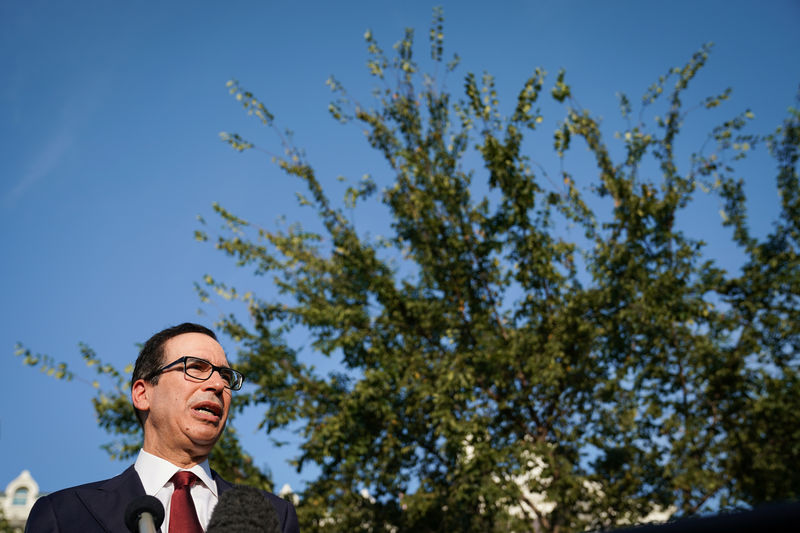By Susan Heavey and Mohammad Zargham
WASHINGTON (Reuters) - The United States is still pursuing its campaign of "maximum pressure" against Iran, U.S. Treasury Secretary Steven Mnuchin said on Thursday, even after President Donald Trump parted ways with his hard-line national security adviser John Bolton.
Mnuchin, in an interview with CNBC, also said that there is no current plan for Trump to meet with Iranian President Hassan Rouhani at the United Nations General Assembly in New York later this month, although he reiterated that Trump is open to meeting with Rouhani with no preconditions.
Trump's remaining national security team is "executing on a maximum pressure strategy against Iran," Mnuchin said.
"There's no question it's working," added Mnuchin, whose department plays a key role in carrying out U.S. policy toward Iran through the imposition of economic sanctions.
Observers had been looking for any signals from Washington on possible changes in policy toward Iran after Bolton left his post abruptly on Tuesday. Amid numerous policy disagreements, Trump said he fired Bolton, while Bolton said he resigned.
Iran, which had singled out Bolton for criticism for his hawkish views, has denounced as "economic terrorism" the increasingly strict U.S. sanctions imposed after Trump last year pulled out of a 2015 nuclear deal between Tehran and six world powers including the United States.
Trump said the agreement, which put limits on Iran's nuclear activities in return for lifting of sanctions, left open a path for Iran to acquire nuclear weapons and did not address Iran's missile program and its regional behavior.
Iran has denied seeking nuclear weapons and has said it hopes to save the nuclear deal but cannot do so indefinitely if it gets none of its economic benefits. Iran has responded to U.S. sanctions with steps to reduce its compliance with the accord, and has said it could eventually leave the pact unless other parties shield the Iranian economy from penalties.
The United States has said it does not seek to topple Iran's government, but rather to change its behavior.
Sanctions against Iran have been effective and could help pressure Iran and its leaders to negotiate with Trump, Mnuchin added.
"We have cut off their money, and that's the reason why, if they do come back to the negotiation table, they're coming back," Mnuchin said, adding that the U.S. strategy toward Iran is similar to the one the Republican president is taking toward trade talks with China.
"If the president can get the right deal that he's talked about, we'll negotiate with Iran. If not, we'll continue the maximum pressure campaign," Mnuchin added.
Iran said on Wednesday that the United States should distance itself from "warmongers" after Bolton's departure, and Tehran stood by its demand that sanctions be lifted before any talks.
Bolton, a leading foreign policy hawk and Trump's third national security adviser, was a chief architect of Trump's strident stance against Iran and instigated the maximum pressure campaign aimed at bringing Tehran to the table to negotiate a new deal on curtailing its nuclear program.
Trump has reimposed sanctions that had been lifted under the 2015 accord and has introduced other measures including threats of sanctions against any country importing oil from Iran, which has led to a sharp drop in Iranian oil exports.
